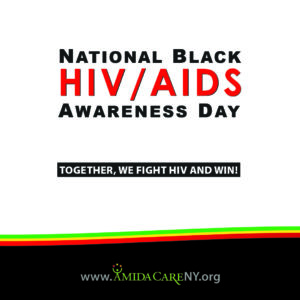National Black HIV/AIDS Awareness Day and the Road to Ending the Epidemic

Over a million people in the U.S. are living with HIV, and unfortunately, black Americans continue to be one of the most affected groups in the country. Although comprising only 13 percent of the population, African-Americans account for approximately 43% of new HIV diagnoses.
According to the latest statistics available from the Centers for Disease Control and Prevention (CDC), black gay and bisexual men accounted for the largest number of HIV diagnoses (9,807) in 2017, followed by Hispanic/Latino men (7,436), and white men (6,982). If current diagnosis rates persist, one in two black gay and bisexual men will be diagnosed with HIV during their lifetimes.
Black women are also disproportionately affected, representing approximately 60% of all women living with HIV in the U.S. In New York City in 2016, the estimated rate of black males living with HIV was 2.9 times that of white males, while the rate of black females living with HIV is 13.9 times that of white females.
February 7 is National Black HIV/AIDS Awareness Day, an annual HIV testing, treatment, and prevention community mobilization initiative. It’s a good time to double down on efforts to end the HIV/AIDS epidemic.
There are many reasons why Black communities bear an undue burden of the HIV/AIDS epidemic, including limited access to pre-exposure prophylaxis (PrEP), a treatment regimen that reduces the risk of contracting HIV by more than 90 percent. Stigma around sexuality and HIV can prevent people from learning about HIV prevention tools such as PrEP, delay the diagnosis of HIV, and discourage affected individuals from seeking treatment. Many social factors including lack of access to food, housing, education, employment, mental and other health services also contribute to HIV health disparities.
Resources:
Fortunately, in 2019 there are more resources than ever to improve the lives of those living with HIV/AIDS and to help prevent its transmission.
The New York City Department of Health offers Play Sure HIV prevention kits, as well as important information about testing and treatment.
The Black AIDS Institute features a variety of resources relating to National Black HIV/AIDS Awareness Day.
The National Black Leadership Commission on AIDS, Inc. (NBLCA) works to educate, mobilize, and empower black leaders to meet the challenge of fighting HIV/AIDS and other health disparities.
Amida Care is a Medicaid Special Needs Health Plan for people living with and at higher risk for HIV and currently serves 7,000+ members throughout the five boroughs of New York City, 67 percent of whom are people of color. Confidential answers are available at 1-855-GO-AMIDA (1-855-462-6432) (TTY 711). Read our blog posts about HIV testing, HIV prevention resources, and accessing HIV treatment.
